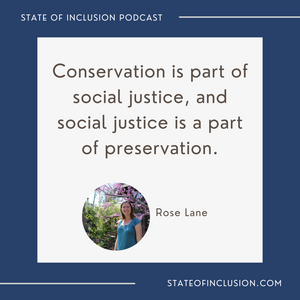Episode 54, 25 min listen
In this episode, we hear from an organization that has come to realize equity and inclusion are integral to its mission. As we talk with Rose Lane of Conserving Carolina, she shares how her organization adapted its strategic plan and value statements and how they formally ensure social justice, equity, and inclusion are part of their everyday work.
AUDIO PLAYER
Listen on Apple Podcasts or Listen on Spotify
ADDITIONAL REFERENCES
Learn more about Conserving Carolina.
If you want a little more inspiration about conservation pioneers, Audrey and Frank Peterman, check out this article about them in the Audbon: The National Parks Have a Diversity Problem. This Couple Has Been Working 20 Years to Fix it and this article in The Groundswell: The Living History of Frank and Audrey Peterman.
If you were intrigued, as I was, by Rose's quote from Andy Goodman, you can learn more about his organization's work on narrative and storytelling at the Goodman Center.
Check out our 10-Week Inclusive Community Outdoor Challenge.
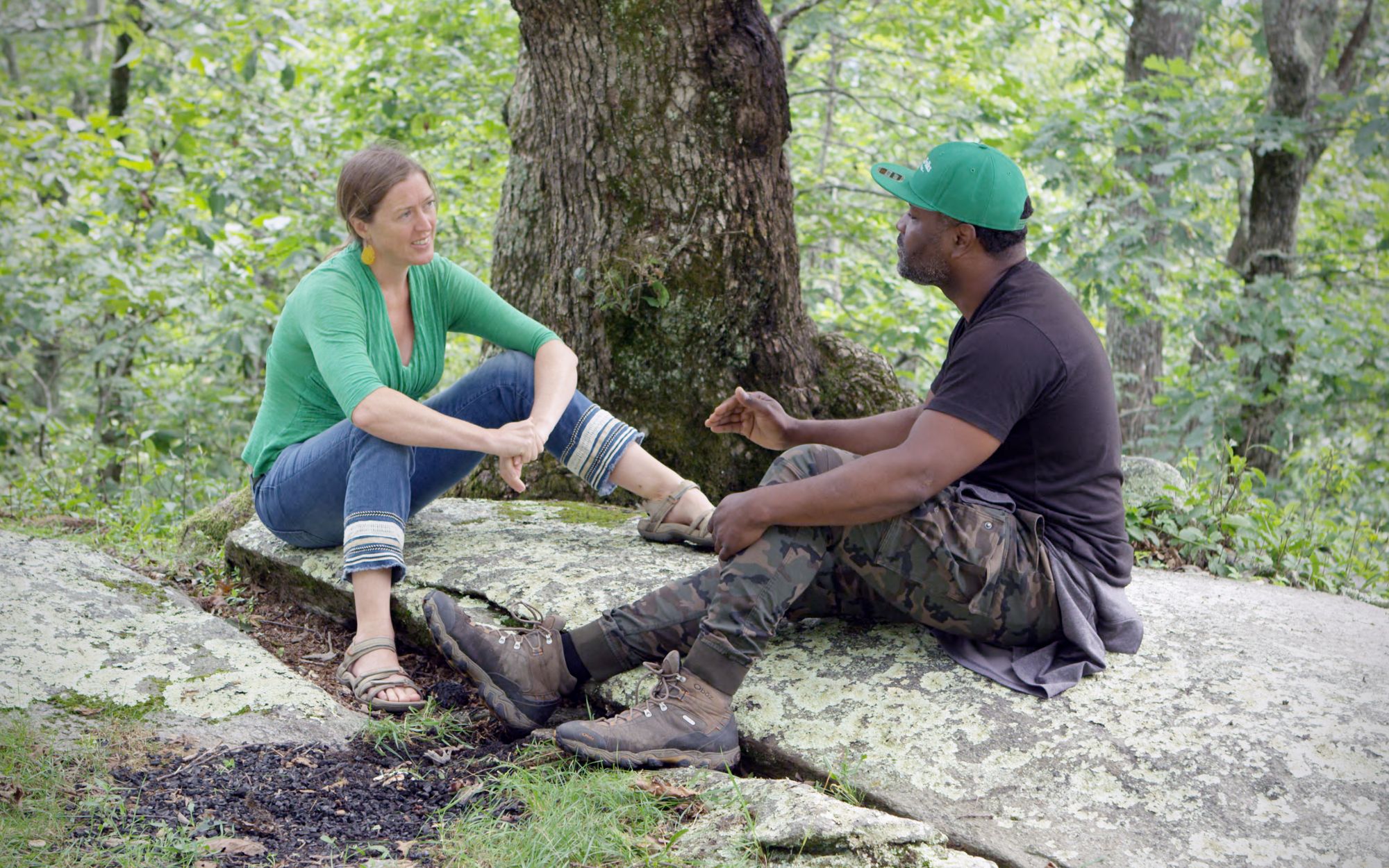
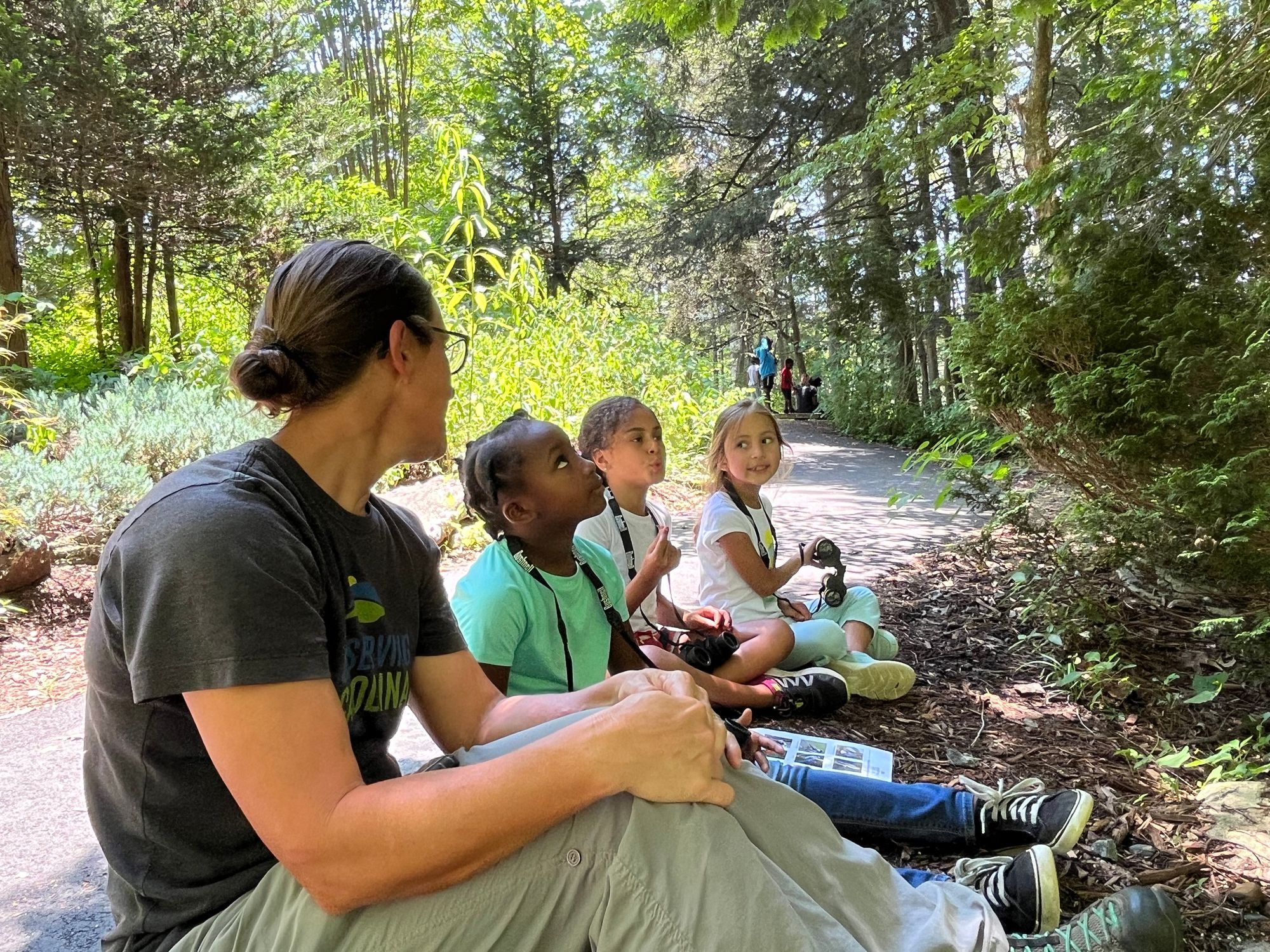
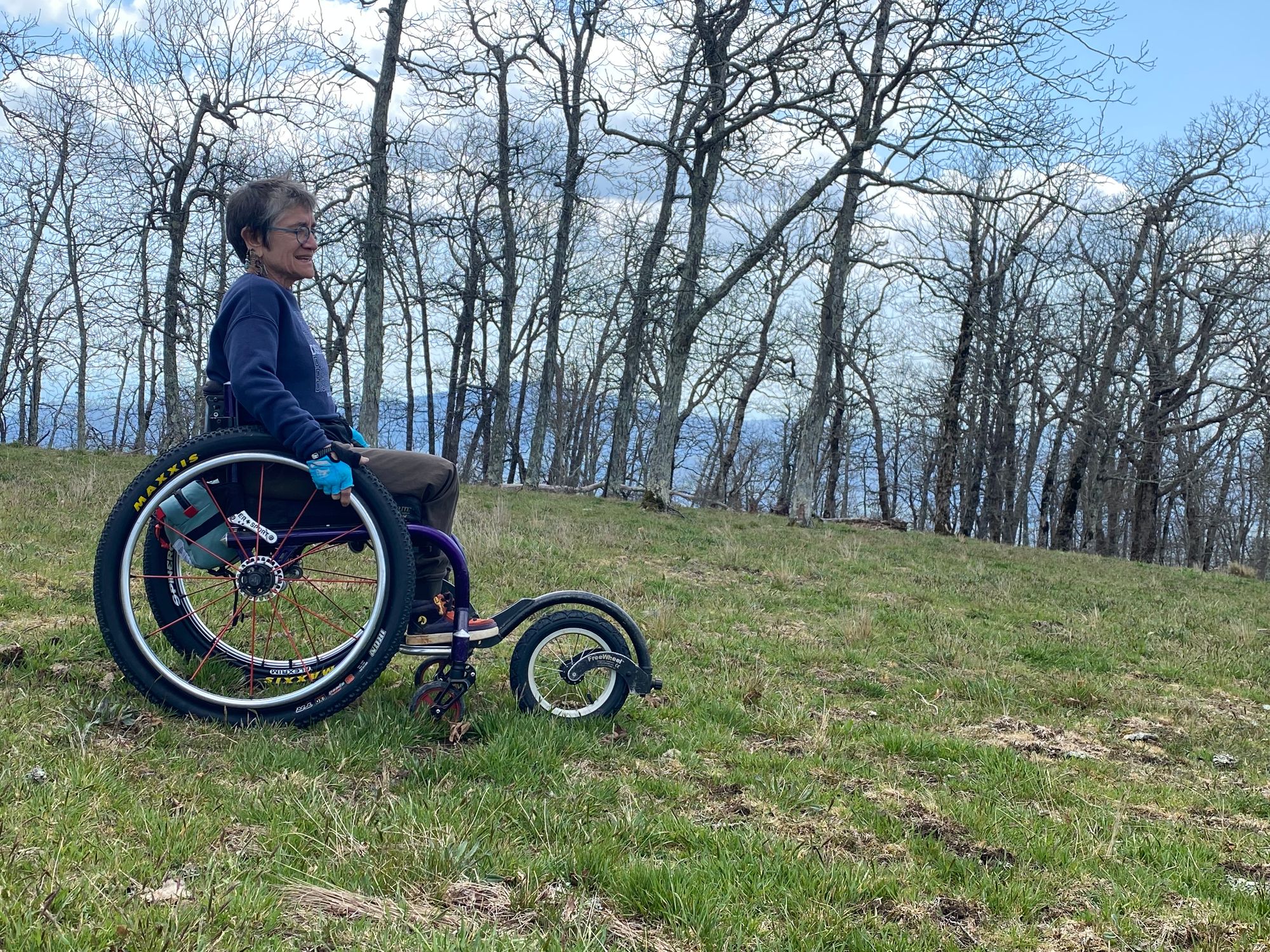
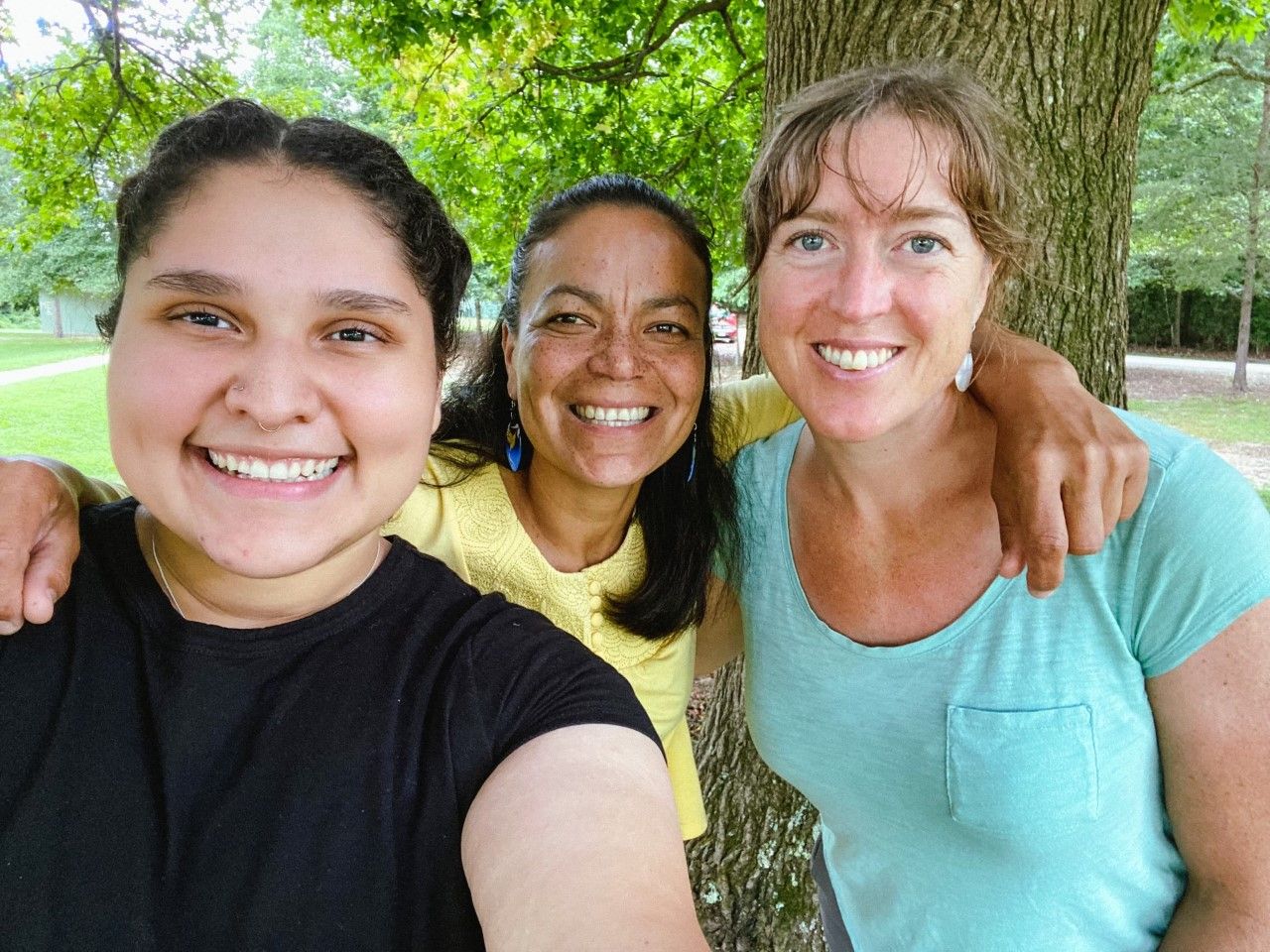
ROSE'S BIO
Rose Lane is the Communications and Marketing Director at Conserving Carolina. As a storyteller, she frequently meets interesting, powerful people and gets to learn about their connection with the natural world and how they give back. Rose appreciates being able to tell stories about the kinds of change we need in our world: restoration, empowerment, connection.
Rose has worked at Conserving Carolina since 2018. Before that, she worked as a journalist, a communications consultant, and an online marketing specialist. Her work in conservation began in 2005, at the Piedmont Environmental Council in her home state of Virginia. Conservation has been a central part of her work ever since. She holds Masters Degrees in literature and fiction writing. As an undergraduate she studied English and religious studies.
Rose lives in Asheville with her husband in a backyard that they've restored to a small patch of thriving nature, full of hummingbirds, goldfinches, butterflies, and occasionally bears. She loves gardening, yoga, mountain biking, time with friends and family, and good stories in all their forms.
FULL TRANSCRIPT
-Introduction
Ame Sanders 00:11
This is the State of Inclusion Podcast, where we explore topics at the intersection of equity, inclusion, and community. In each episode, we meet people who are changing their communities for the better, and we discover actions that each of us can take to improve our own communities. I'm Ame Sanders. Welcome.
So, if you've been listening to the podcast for the last few weeks, you know that along with the podcast, we're following a 10-week inclusive community outdoor challenge. And you may remember my sacred saunter from Week Four was with Dr. Mattie Decker, who is working in partnership with and on lands conserved by Conserving Carolina. As I learned more about Conserving Carolina's work, I was pleased to learn about their strong commitment to equity and inclusion in the outdoors and in their work. It made me want to learn even more, so I reached out.
So today, I'm happy to welcome Rose Lane of Conserving Carolina. Welcome, Rose.
Rose Lane 01:15
Thank you, I'm glad to be here.
-About Conserving Carolina
Ame Sanders 01:17
So, Conserving Carolina's mission is to "protect, restore, and inspire appreciation of the natural world." That's about conserving land, but it's about more than just conservation. So, maybe you can tell us a little bit about what your organization does and just how you go about your work and where you work.
Rose Lane 01:35
Well, we work in the southern part of Western North Carolina. So, we're primarily working in Henderson County, Transylvania County, Polk County, Rutherford County, in the Hickory Nut Gorge near Lake Lure, and also in South Carolina in the Landrum area of South Carolina.
So, our mission, as you said, is to "protect, restore, and inspire appreciation of nature." I think we have to do these three things because the land protection is a thing that we've always done where we know that we have these wonderful places--these wonderful mountains, rivers, and forests--that we don't want to lose. We don't want them to be developed and turned into something else. So, we need to protect those places. But then, at this point in time, it's also really important for people who love the earth, which is really all people right, to be involved in restoration and kind of turning things around and taking places that aren't as thriving as they could be and make them really thriving again. So, we're bringing those places back.
It's really important for us also to be inspiring people to have a strong, loving relationship with our natural world. Because if we don't have people who care deeply, then we don't have a conservation movement. We have nothing to work with. You know, we don't have the volunteers. We don't have the donors. We don't have the political will so that we have funding for our projects. We also just need people who care about the Earth and do that in their own way, whether they're growing gardens of native flowers or they're doing their part for climate solutions. We just need everybody who lives on this earth to be invested in this earth.
Ame Sanders 03:18
Maybe you can tell us a little bit about how your organization got started and some of the programs that you have?
Rose Lane 03:24
Well, we used to be two different land trusts. We were Carolina Mountain Land Conservancy and Pacolet Area Conservancy. That's been over 25 years of roots in these communities. Then in 2017, those two groups decided to merge because they were working in a very similar area on similar projects, and they decided that it would be more efficient to just join forces and work together as one main interest. So, they did. That was just before I joined the staff in 2018. But in 2017, those two groups came together and formed Conserving Carolina. I think of programs as in four categories, which is pretty similar to the mission statement.
We conserve land and water. We restore natural areas. We build trails. And we engage our communities. So, there's a lot I could say about that. So honestly, it's an organization with really wide programs. We're really involved in some big things, but I'll just mention a few other things that we're working on. We are spearheading the Hickory Nut Gorge State Trail, which is a 100+ mile network of hiking trails. We've got 38 miles open to the public, and we're opening more all the time. There was recently the Strawberry Gap Trail that opened last year.
In addition, we've helped to open a huge amount of public land in this region for everybody to enjoy. So, we've opened up more than 30 places that are open to the public to enjoy, which includes two new state parks--DuPont State Recreational Forest and Headwaters State Forest, and also some significant additions to Pisgah National Forests. We are currently working to create 50 miles of new rail fields. So that's the 19-mile Ecusta Trail and the 31-mile Saluda Grade Trail, which could ultimately be connected into a continuous, more than 50-mile corridor of rail trails.
Also, I want to highlight our restorations along the French Broad River. So, we have more than 10 sites in the upper French River watershed where we're restoring land, bringing back wildlife habitat, making it a better place for clean water, and for all these benefits for people. So, we've got 10 places where we're already making that happen, and it's adding up to this corridor of restorations that is going to make the river a much more thriving and bountiful place than is even today. And it's already beautiful. So, we have all of those programs. We have really extensive community engagement programs, which I'm sure we'll talk about as we move forward. But I'll just say, we're really doing a lot to try to engage all kinds of people in our communities.
-At a Crossroads
Ame Sanders 06:12
One of the things I noticed is that you have a strong commitment to equity and inclusion. What I saw was that your strategic plan actually called this out as an element of your strategic plan. So, one of the things I wanted to talk with you about today was, tell me about it? What does it look like for you guys? Has it always been part of your mission or is this something that you've grown into? Just tell me about how your organization views its orientation towards equity and inclusion.
Rose Lane 06:42
Yeah. Well, when I came on board in 2018, there was a lot of discussion about it. So, I feel like the organization at that point was at a little bit of a crossroads. As you know, 2018 was this period where there's this growing groundswell of interest in social justice and then in making change in our society. So, we were kind of grappling with what that means for us as a conservation organization. But you know, there were a variety of other perspectives on the matter. So, there were definitely people who are like, "That doesn't seem like a change that we need to make. It's not the way that we've historically operated, where our focus has really been on protecting land and protecting water. So, let's just focus." Like one person who had that point of view said, "Stick to your knitting."
So, that was one point of view, to stay to what they felt was the core mission. Protect land and water, and don't stray from that core mission into this other sense of what our mission could be. But then there was this other school of thought, which is that social justice is really a part of everything across our society, and also land protection and care for the earth is a part of everything across our societies. These things are interwoven. There's also been really increasing awareness in the land trust community the ways that we haven't done enough. We haven't really created conservation movement that is for everyone, so increasingly awareness in the land trust community that that's a problem that we need to deal with.
We revised the strategic plan and completed that plan in 2020. So, a lot of these conversations took place as a part of that process. So, it's something that people give a lot of thought to and ultimately the point of view that conservation is part of social justice and social justice as a part of preservation prevailed. It did become part of our strategic plan. We identified it as one of five core strategic directions for the organization. Also, we identified equity as one of our five core values. So we arrived at clarity about our commitment to social justice. I feel like at this point in time, there's a lot of clarity that that's an important part of our work.
-A Strategic Commitment to Social Justice
Ame Sanders 09:15
Would you share a little bit about areas where you feel like it's made a difference in your work or where you've had successes? Or maybe even if you're willing to share areas where you guys are still trying to figure it out or maybe have hit some roadblocks or barriers?
Rose Lane 09:30
Yeah. Well, it was interesting thinking about this interview and looking back to some of the statements that we made at the time of the strategic plan. I was involved in helping to write the commitment to social justice. It was interesting to look back at that and see how a lot of the things that we had to say at that time were fairly aspirational. A lot of things that I can tell you at this time are more concrete. So, I'm not trying to say that, "Yay. We have arrived." We recognize that we're at the really early stages of becoming a fully inclusive and diverse organization that involves and benefits and represents everybody in our communities.
At the same time, we have a lot of things that we can point to that have happened in that period of time. So I'll just say, as this kind of broad overview, we've done have a lot of internal work and trainings and learning to make ourselves more knowledgeable so that we can do the work in a way that is more supportive and empowering. I think everybody who's worked in this field have probably thought about it and understands that good intentions don't necessarily lead to good results, right? People can do things in a way that is counterproductive and harmful.
So, we've been, first of all, investing in ourselves and making sure that we can do this work in a well-informed, sensitive, and knowledgeable way. I can just tell you that we have a lot of programs where we're working to grow our connection with the Latinx community. We have a lot of programs working with youth in schools in our community. We have a number of partnerships with affordable housing organizations creating natural areas near neighborhoods that are built for affordable housing.
We have started focusing a lot more on trails and outdoor areas that are going to be accessible to more people. We're growing a relationship with the Cherokee. We just have a lot of relationships with community leaders and groups that are helping us connect with more racially diverse groups in our communities, which is sort of fertilizing the ground for more work to happen.
Ame Sanders 11:49
Do you think these things would have happened without your strategic commitment and your value statement?
Rose Lane 11:57
I think that having a conscious, intentional decision in the strategic plan that we were going to work on social justice and equity as a core part of our work has been really essential in supporting these programs. We know that this is what we do. So, we need to stand behind what will actually work in that direction.
Ame Sanders 12:17
Are there any areas that you feel like need more attention today, or that are particularly still thorny challenges for you guys to work through?
Rose Lane 12:27
Well, I have heard guests on your show talk about the difficulty of creating a more diverse staff. I know that this issue for us is in our hiring for staff and our hiring for AmeriCorps members. I think there is a lot of interest in having a more diverse staff, but we don't always see all the applicants coming in to serve as roles. So, you know, that's been challenging.
I think it speaks to how hard it can be to do this work when you're living in a society where there really is like deep structural inequality on a lot of levels. There's inequality of opportunity, and you don't see as many people coming into the career field who then we could hire. So, we are taking some steps to hopefully engage young people from all kinds of diverse backgrounds and let them know that there are career paths in this field. But it is easier said than done to have a more diverse staff.
-The Power of Stories
Ame Sanders 13:29
One of the things Rose that I discovered in looking at your background a little bit was that you and I share a common interest. And that's a love of storytelling. So, maybe you can tell me a little bit about why you think stories matter and why you think it matters whose story we hear and how you guys might be considering that in your work on inclusion and equity with Conserving Carolina?
Rose Lane 13:55
Well, I just think that stories are a powerful way to engage people in the work. I think that people are just wired to be more interested and engaged by stories than they would in other ways that you might approach them with facts and figures and arguments and logical reasons why we should be doing this. Of course, there's a role for those things, but stories can kind of engage people more. Also, people believe what they are willing to believe.
Andy Goodman, who said that:
"the stories that you have in your mind are the gatekeepers for the facts that you're going to let in."
So, if the stories that you have in your mind are incompatible with facts that somebody is trying to share with you, then you can just shut out those facts. I don't believe you and your numbers. But, if you can change the story that somebody has in their mind, then they may be more persuadable. Also, we live in a society right now that is very divided, where people don't feel connected to each other. And I think that encountering and engaging with somebody's story is a way to build empathy and understanding between people.
To be clear, storytelling can also have a dark side. Stories can be used for disinformation, just like anything else that's powerful. Anything that's powerful can be used for a variety of purposes, right? So, you can use stories for misinformation, but my hope as a storyteller is that storytelling can build empathy and understanding with people and that the stories that we tell them also inspire people. So, I get to meet people who are doing really wonderful things. That's the criteria of selection for me to do an interview with somebody is they're doing something really awesome and then I have the honor of talking to that person.
Ame Sanders 15:50
I have the same objective, by the way. It's the same thing for me.
Rose Lane 15:53
Yeah. I have the honor of getting to talk to that person and getting to know their story and share their story that they're sharing with me, so kind of collaborating with them and sharing that story with the world. My hope is that as people encounter these stories, that something in it may resonate with them and they might say, "I want to be like that person. That person is cool. That person has a value that resonates with me, and I can see what they're doing. And I want to do something like what they're doing there. I want to be a part of this conservation movement that they're a part of."
That can be in a whole lot of ways. I've gotten to tell the stories of, for example, a woman who is a farmer who grows and sells native plants, and she's an educator. Her role is to really engage people and restoring native plants where they are they live so they'll have more nature in their yards. I got to interview a young Cherokee artist and a basket maker who shared with me about how they don't have all of the basket making materials that they need, and how restoration at places Mud Creek can bring back some of those materials so that they can continue these traditional crafts.
I got to talk with Earl Hunter who we've talked about and the work that he's doing through Black Folks Camp Too to create a more inclusive and diverse outdoor culture. I got to talk to a preservation landowner who was over 100 years old at the time and was still out working hard in his forest, which is full of native plants. He's been doing that for a long time and how he is a centenarian, looked forward to the future and imagined his forest beyond his own lifetime. I've gotten to talk to our wonderful volunteers. The man who leads our kudzu warriors, and folks that work with a trail building, just so many. So, you get the idea. There's not just one way to be a part of this good work. There are all kinds of ways. My hope is that people will, in these stories, see something that that inspires them and in some way that person becomes a model for them.
-Stepping Up to Build a More Inclusive Outdoors
Ame Sanders 17:59
As you're saying, people come to this work for all different kinds of reasons, with different backgrounds and different expectations. One of the challenges that I'm putting out there in our 10-week outdoor challenge is for people to step up and to become more involved. So, a question I wanted to ask you specifically is, what advice or suggestions might you have for our listeners as a way for individuals to contribute to and or help build a more inclusive and equitable outdoors with your organization or beyond your organization?
Rose Lane 18:38
Yeah, well, I think what Earl Hunter from Black Folks Camp Too. His advice for us is that because we want the outdoors to be more diverse than it is, if you're a white person like me, then you should reach out to a person of color and invite them. So, invite somebody out into the outdoors and bring them out there with you. So, I want to pass that on from Earl.
But in my mind thinking about things, I wonder if that's really what people need from me. I think about essays like the one that is linked on your site like "We're here. You Just Don't See Us." That is such a wonderful essay that I reread this week, because it was linked on your site. I think it's Latria Graham who points out that people of color and all kinds of people are already out in the world. They're already connected. You know, we're all earthlings. We all already have a connection to the natural world. So, just kind of recognizing that people are already connected. They're already out in the world, and then thinking about ways that we can strengthen that and support that.
It's important to us at Conserving Carolina that we think about equity and inclusion as very multi-dimensional. So, we recognize that a lot of different kinds of people are excluded from the outdoors or don't feel as safe in the outdoors. So, people of color may not feel as included and invited, but also, young people increasingly we see a difference in generations where kids don't have the same opportunities their parents and grandparents did. So, that's something that we want to address.
We know that socioeconomic issues can be a factor. If you don't have the resources that it takes to get out and do an activity outdoors. Then also just ability and fitness. So, we realized at a certain point that a lot of our trails were really geared towards somebody with a high level of ability and fitness and interest in vigorous outdoor activities. So, so there's all kinds of people where we're working more to make sure that they can get out and enjoy this beautiful world. So, I would just say like, if it makes sense to you to invite someone out, or bring someone out--maybe that is a child, maybe it's someone you know in your life, maybe it's somebody who's new to an activity that you really enjoy doing. So, then maybe you have the opportunity to invite somebody out.
Then also like people who are already out there who are expressing their connection and their love for nature in their way and engaging, engaging others around them. So, just how can you support that? Can you just support that by, like, by being friendly by being respectful about being appreciative? Or, are there more tangible ways that you could step up and support that? So that's something that I think about in my work. People are already out there. They're already doing the work. They're already engaged in their community. How can we be supportive and make them stronger in the work that they do? I also want to pass on something from Frank Peterman. So, Audrey and Frank Peterman are leaders in the work to diversify people's engagement, especially with national parks in America. I've heard them speak a few times and Frank has this wonderful way of closing, which I'll paraphrase. But he says,
"Don't worry about changing the whole world. Don't worry about saving the world. It's not your job. But do the work that you can do. Do your part and take joy in your work."
-Conclusion and Summary
Ame Sanders 22:34
Rose Lane, thank you so much for the advice and for that lovely closing thought as we wrap up, and thanks for your time today and the work you do with Conserving Carolina.
Rose Lane
Thank you.
Ame Sanders 22:49
I loved this conversation with Rose Lane from Conserving Carolina. She's very soft spoken and unassuming, but she put out plenty of nuggets of wisdom or as my colleague Rodney calls them, "jewels." It's always exciting for me to find an organization that has consciously incorporated inclusion and equity as part of their mission and that are finding ways to live that out in the world.
In Conserving Carolina's case, they made equity and inclusion part of their strategic plan and also made equity one of their core values. It also sounds like Conserving Carolina started with a purposeful step of education and self-work for them as an organization and as a staff so that they could carry out this strategy in a positive way. I loved Rose's quote that good intentions don't always lead to good results. You know, that's something for us all to remember.
And, off course, I love talking with her about our common interest in stories and learning about how Rose views that in the work she does with Conserving Carolina. During that discussion, she shared another quote with us, this one from Andy Goodman, that bears repeating: that "stories are the gatekeeper of the facts that we let in." Wow! "That stories are the gatekeeper of the facts that we let in."
Rose went on to tell us that it isn't necessarily about using stories to persuade people, but about changing the stories in their heads with the hope and intent to have them see and take in information and facts differently going forward.
Then, as we wrapped up, Rose shared that there are many different ways that each of us can engage in building a more inclusive outdoors. There isn't one way but there are many ways. She also reminded us that it isn't about changing the world, but doing what we can and finding joy in our work.
This has been the State of Inclusion podcast. If you enjoyed this episode, the best compliment for our work is your willingness to share the podcast or discuss these ideas with others. If you'd like to hear more about the practice of building an inclusive and equitable community, head over to theinclusivecommunity.com and sign up for our newsletter. Also, feel free to leave us a review or reach out. We'd love to hear from you.
Thanks so much for listening and join us again next time.
CONTRIBUTORS
Guest: Rose Lane
Host: Ame Sanders
Social Media and Marketing Coordinator: Kayla Nelson
Podcast Coordinator: Emma Winiski
Sound: FAROUT Media


